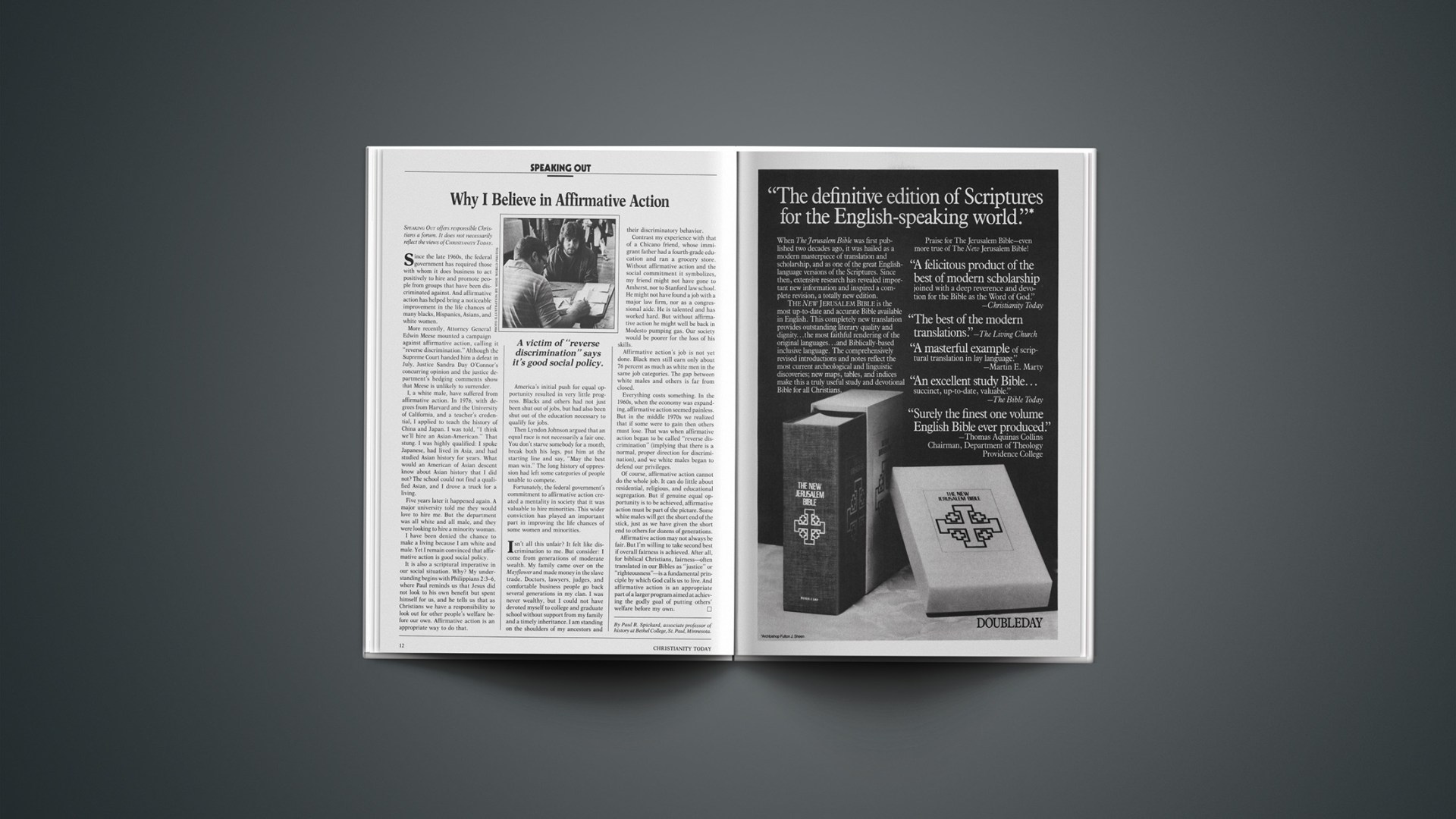Speaking Out offers responsible Christians a forum. It does not necessarily reflect the views of CHRISTIANITY TODAY.
Since the late 1960s, the federal government has required those with whom it does business to act positively to hire and promote people from groups that have been discriminated against. And affirmative action has helped bring a noticeable improvement in the life chances of many blacks, Hispanics, Asians, and white women.
More recently, Attorney General Edwin Meese mounted a campaign against affirmative action, calling it “reverse discrimination.” Although the Supreme Court handed him a defeat in July, Justice Sandra Day O’Connor’s concurring opinion and the justice department’s hedging comments show that Meese is unlikely to surrender.
I, a white male, have suffered from affirmative action. In 1976, with degrees from Harvard and the University of California, and a teacher’s credential, I applied to teach the history of China and Japan. I was told, “I think we’ll hire an Asian-American.” That stung. I was highly qualified: I spoke Japanese, had lived in Asia, and had studied Asian history for years. What would an American of Asian descent know about Asian history that I did not? The school could not find a qualified Asian, and I drove a truck for a living.
Five years later it happened again. A major university told me they would love to hire me. But the department was all white and all male, and they were looking to hire a minority woman.
I have been denied the chance to make a living because I am white and male. Yet I remain convinced that affirmative action is good social policy.
It is also a scriptural imperative in our social situation. Why? My understanding begins with Philippians 2:3–6, where Paul reminds us that Jesus did not look to his own benefit but spent himself for us, and he tells us that as Christians we have a responsibility to look out for other people’s welfare before our own. Affirmative action is an appropriate way to do that.
America’s initial push for equal opportunity resulted in very little progress. Blacks and others had not just been shut out of jobs, but had also been shut out of the education necessary to qualify for jobs.
Then Lyndon Johnson argued that an equal race is not necessarily a fair one. You don’t starve somebody for a month, break both his legs, put him at the starting line and say, “May the best man win.” The long history of oppression had left some categories of people unable to compete.
Fortunately, the federal government’s commitment to affirmative action created a mentality in society that it was valuable to hire minorities. This wider conviction has played an important part in improving the life chances of some women and minorities.
Isn’t all this unfair? It felt like discrimination to me. But consider: I come from generations of moderate wealth. My family came over on the Mayflower and made money in the slave trade. Doctors, lawyers, judges, and comfortable business people go back several generations in my clan. I was never wealthy, but I could not have devoted myself to college and graduate school without support from my family and a timely inheritance. I am standing on the shoulders of my ancestors and their discriminatory behavior.
Contrast my experience with that of a Chicano friend, whose immigrant father had a fourth-grade education and ran a grocery store. Without affirmative action and the social commitment it symbolizes, my friend might not have gone to Amherst, nor to Stanford law school. He might not have found a job with a major law firm, nor as a congressional aide. He is talented and has worked hard. But without affirmative action he might well be back in Modesto pumping gas. Our society would be poorer for the loss of his skills.
Affirmative action’s job is not yet done. Black men still earn only about 76 percent as much as white men in the same job categories. The gap between white males and others is far from closed.
Everything costs something. In the 1960s, when the economy was expanding, affirmative action seemed painless. But in the middle 1970s we realized that if some were to gain then others must lose. That was when affirmative action began to be called “reverse discrimination” (implying that there is a normal, proper direction for discrimination), and we white males began to defend our privileges.
Of course, affirmative action cannot do the whole job. It can do little about residential, religious, and educational segregation. But if genuine equal opportunity is to be achieved, affirmative action must be part of the picture. Some white males will get the short end of the stick, just as we have given the short end to others for dozens of generations.
Affirmative action may not always be fair. But I’m willing to take second best if overall fairness is achieved. After all, for biblical Christians, fairness—often translated in our Bibles as “justice” or “righteousness”—is a fundamental principle by which God calls us to live. And affirmative action is an appropriate part of a larger program aimed at achieving the godly goal of putting others’ welfare before my own.
By Paul R. Spickard, associate professor of history at Bethel College, St. Paul, Minnesota.










